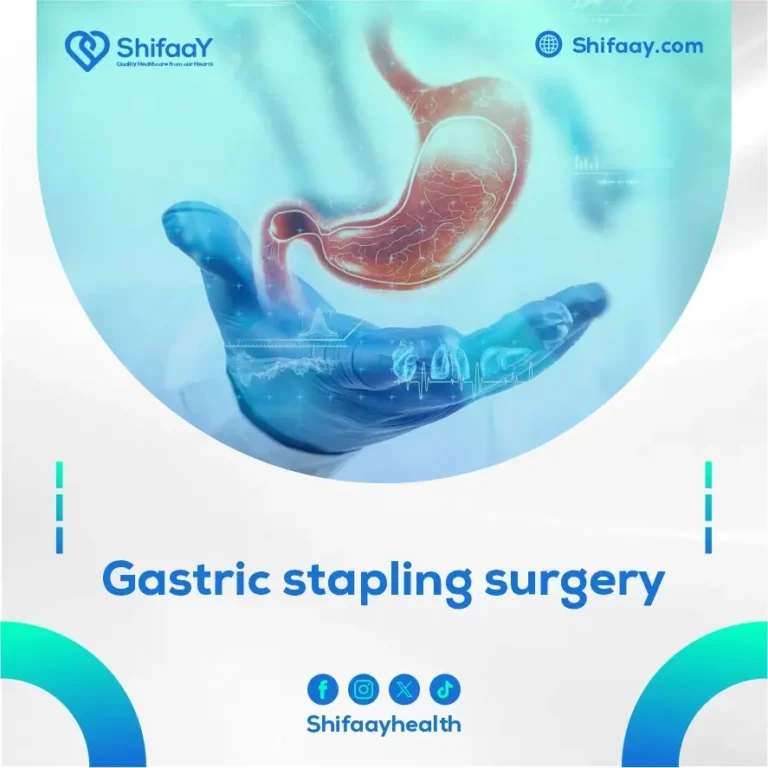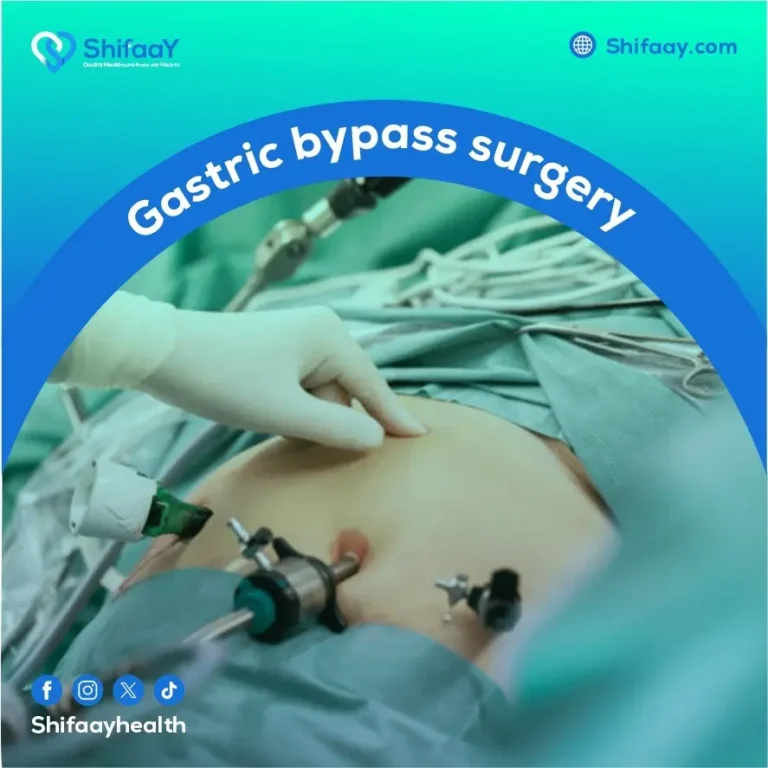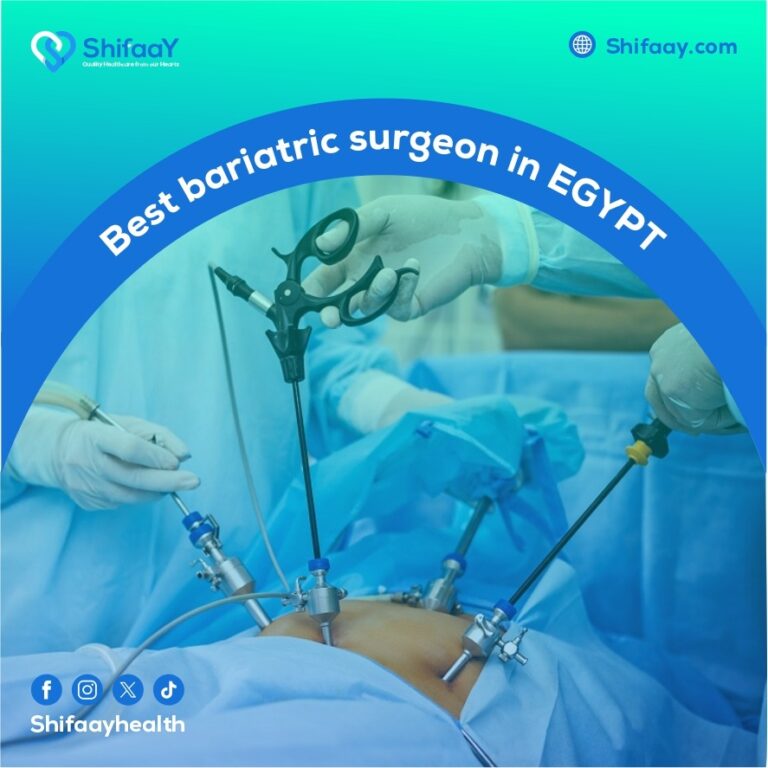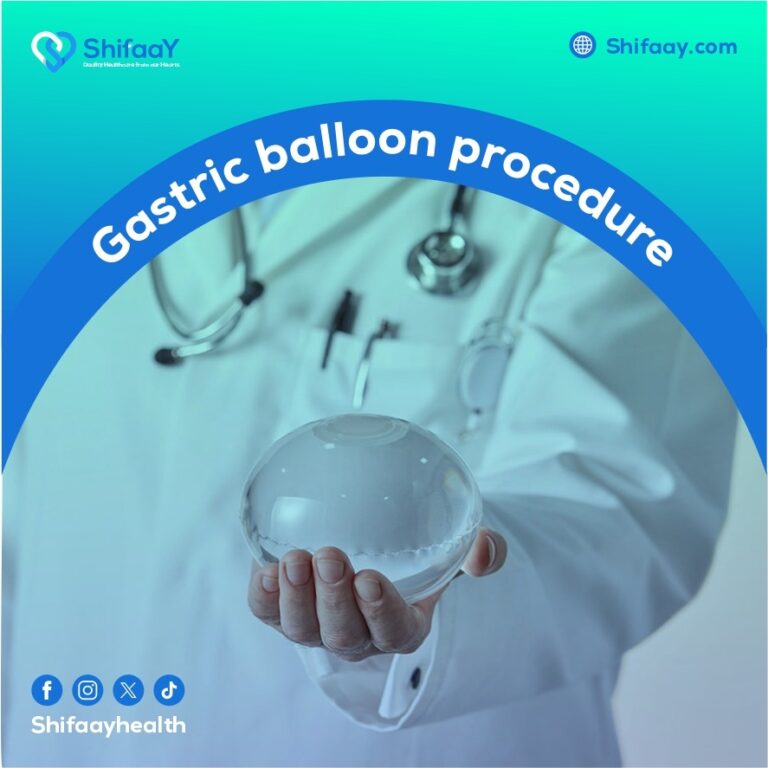What is Gastric Sleeve Surgery?
The cost of gastric sleeve surgery in Egypt has become one of the most important topics frequently on the minds of individuals seeking fast and effective medical solutions for obesity and a healthier lifestyle. This surgery is considered one of the most prominent bariatric procedures, particularly for those who have not achieved desired results through traditional methods such as diets or exercise. It works by reducing the size of the stomach, thereby limiting food intake, leading to significant weight loss and an overall improvement in health. It also helps reduce the risk of several chronic diseases, such as diabetes and hypertension.
With the increasing demand for bariatric surgeries in Egypt, many people often wonder about the average cost of gastric sleeve surgery, especially given the significant differences among various medical centers in terms of quality, technology used, physicians’ expertise, and pricing policies. The price usually varies considerably based on several key factors, including whether the procedure is performed in a private or public hospital, the type of surgical instruments used—whether standard or advanced, such as smart staplers—and whether the package includes post-operative accommodation and care. Additionally, the geographic location of the medical center plays a role, as prices tend to be higher in major cities. The reputation and years of experience of the bariatric surgeon also significantly influence the cost.
We proudly introduce you to Shifaay Center for Healthcare, one of the leading specialized medical centers for bariatric surgeries in Egypt. Shifaay combines extensive medical expertise with state-of-the-art technology to ensure the highest standards of safety and effectiveness. The center offers a wide range of comprehensive medical services tailored to patients with obesity, beginning with the initial consultation and continuing through to the gastric sleeve surgery itself—performed by a team of Egypt’s most skilled surgeons—and ending with precise post-operative follow-up to ensure optimal results.
Moreover, Shifaay stands out by utilizing the latest surgical innovations such as smart staplers and advanced surgical tools, which help minimize complications and accelerate the healing process—making it an ideal destination for those seeking both quality care and competitive pricing.
Laparoscopic Gastric Sleeve Surgery

There is no doubt that overeating is one of the main causes of the gradual expansion of the stomach. A person often begins to consume more food than their daily needs to feel full, and over time, this stretching may become a harmful eating habit that leads to morbid obesity—a major health concern affecting millions worldwide. Obesity significantly impacts overall health and increases the risk of several chronic diseases, such as type 2 diabetes, hypertension, atherosclerosis, as well as joint problems and respiratory issues. In addition, it may cause negative psychological effects, including low self-esteem, feelings of isolation, and depression.
Since diets and exercise don’t always produce tangible results—especially in cases of morbid obesity—many people have started to seek effective medical solutions such as bariatric surgeries, with gastric sleeve surgery emerging as a safe and effective treatment option to help restore a healthy lifestyle.
Gastric sleeve surgery is a significant surgical procedure in which approximately 80% of the stomach is removed, leaving it shaped like a tube or a banana. The procedure is known by several common names, such as “stomach reduction” or “stomach stapling.” It aims to limit the amount of food a person can consume and to reduce the secretion of the hunger hormone ghrelin. This procedure is typically performed using advanced laparoscopic techniques, through a few small incisions only a few centimeters long. During the surgery, the doctor uses advanced tools like the smart stapler, which has greatly improved both safety and precision.
Laparoscopic gastric sleeve surgery has become a common surgical option for individuals suffering from morbid obesity, especially those who have failed to lose weight through conventional dieting. The surgery significantly reduces stomach capacity, which limits food intake per meal and promotes prolonged satiety. Therefore, to ensure the success of such procedures and avoid future complications, it is crucial to choose a specialized surgeon with extensive experience in performing this type of surgery.
We proudly introduce Shifaay as one of the leading medical centers for bariatric surgery in Egypt, known for its high precision and trustworthy results with patients.
Read aslo: Gastric Stapling Surgery
Stages of Laparoscopic Gastric Sleeve Surgery
Gastric sleeve surgery in Egypt is considered one of the most prominent modern surgical solutions for treating morbid obesity. This procedure aims to reduce the size of the stomach, thereby limiting the amount of food a person can consume. As the surgery is typically performed using advanced and precise medical techniques such as laparoscopy, it involves a series of well-organized steps designed to ensure patient safety and achieve optimal outcomes. Below are the main stages of this procedure:
- General Anesthesia:
The procedure begins with administering full anesthesia under the supervision of an anesthesiologist to ensure the patient does not feel any pain throughout the surgery. - Making Small Surgical Incisions:
The surgeon makes several small incisions in the abdominal wall to insert the surgical instruments and the laparoscope, which displays the surgery details on an external monitor. - Insufflation of the Abdominal Cavity:
A special gas, usually carbon dioxide (CO₂), is insufflated into the abdominal cavity using a fine needle. This elevates the abdominal wall away from the internal organs, creating enough space for the surgeon to safely view and manipulate the organs. - Stomach Resection and Stapling:
A large portion of the stomach — approximately 70 to 80% — is removed using advanced laparoscopic tools such as surgical staplers. This results in a new, tube-shaped stomach that limits food intake. - Leak Test:
After stapling the stomach, the surgeon performs a special test to ensure there are no leaks from the stapled area, ensuring the stomach is sealed securely. - Closing the Incisions:
The small incisions in the abdomen are then closed cosmetically using fine sutures. This helps minimize scarring and promotes a more aesthetically pleasing recovery. - Transferring the Patient to the Recovery Room:
The patient is then transferred to the recovery room for monitoring after the anesthesia wears off, before being moved to their regular room in the medical center. - Surgery Duration and Hospital Stay:
The gastric sleeve surgery typically takes about 45 minutes. In most cases, the patient does not need to stay in the hospital or medical center for more than 24 hours after the procedure.
The Difference Between Gastric Sleeve Surgery and Gastric Bypass Surgery
It is well known that bariatric surgeries are among the most advanced medical interventions frequently used by specialists in the field of obesity to help patients get rid of excess weight, especially when conventional methods such as diet and exercise fail to achieve desired results. Among the most common and effective surgical solutions are gastric sleeve surgery and gastric bypass surgery. While both procedures share the same primary goal—weight loss and improved quality of life—each has its own mechanisms, benefits, and risks. The differences in surgical technique and potential side effects make each procedure more suitable for specific patient conditions.
First: Gastric Sleeve Surgery
Gastric sleeve surgery is a surgical procedure in which a large portion of the stomach—typically about 70% to 80%—is removed, leaving behind a narrow, tube-like pouch resembling the shape of a banana. This significantly limits the amount of food a person can consume in one sitting and reduces the secretion of the hunger hormone ghrelin, thereby contributing to weight loss.
In Egypt, gastric sleeve surgery is considered relatively simple compared to gastric bypass surgery. The recovery period is typically shorter, with most patients discharged from the hospital within two to three days. Additionally, it tends to have fewer complications, making it an ideal and suitable option for many patients suffering from obesity without complex gastrointestinal issues.
Second: Gastric Bypass Surgery
Gastric bypass is a more complex surgical procedure that combines both stomach reduction and rerouting a portion of the digestive tract. A small pouch is created from the stomach and connected directly to a distant part of the small intestine. This results in reduced food intake and decreased absorption of calories and nutrients, thereby promoting weight loss and enhancing the patient’s overall quality of life.
Gastric bypass surgery is considered more effective in achieving rapid and significant weight loss. It is often used for patients with type 2 diabetes or those suffering from severe gastroesophageal reflux disease (GERD). However, it also comes with certain challenges, such as a higher risk of vitamin and mineral deficiencies. Moreover, patients typically require a longer recovery period and the lifelong use of nutritional supplements.
The Cost of Gastric Sleeve Surgery in Egypt
In 2025, the cost of gastric sleeve surgery in Egypt has become more diverse and flexible than in previous years. This reflects the significant advancements in the medical sector and the increasing number of specialized medical centers offering this service at a range of prices suitable for various patient categories. The cost of this type of surgery typically ranges between EGP 25,000 and EGP 60,000. This variation is mainly due to several factors, most notably the experience of the performing surgeon and whether the medical center utilizes advanced technologies such as laparoscopic sleeve gastrectomy. Additionally, the cost often includes associated medical services such as laboratory tests, hospital stay, and postoperative follow-up, which allows patients to choose the most suitable option without compromising the quality of care.
It is normal for the cost of gastric sleeve surgery in Egypt to vary from one patient to another, as the patient’s medical condition plays a key role in determining the most appropriate surgical approach. Choosing an experienced surgeon with extensive expertise in performing this specific type of bariatric surgery is also essential to maximizing the chances of success—though it may slightly increase the overall cost. Moreover, modern surgical techniques such as laparoscopic or modified gastric sleeve procedures can also affect the final cost of the surgery.
Therefore, if you are looking for an accurate, clear, and personalized estimate of the cost of gastric sleeve surgery in Egypt, you may consider reaching out to Shifaay Healthcare Center, one of the top specialized centers that has established itself as a leading destination in the field of bariatric surgery. This reputation is owed to its highly skilled medical team, which offers a comprehensive range of distinguished medical services using the latest global technologies—ensuring the best possible results at affordable prices, without compromising the quality of care or the desired outcomes.
Recovery Period After Gastric Sleeve Surgery
It is important to keep in mind that post-operative care following gastric sleeve surgery in Egypt is one of the most crucial factors that can significantly and effectively contribute to accelerating the healing process and ensuring full recovery. After the surgery is completed, the patient may be transferred directly to the intensive care unit for close monitoring for at least 24 hours to ensure the stability of their health condition. During this period, it is essential to keep the surgical wound clean and completely dry, avoiding any exposure to water or fluids during the first two days post-surgery.
During the first week after gastric sleeve surgery, patients are advised to consume fluids in moderation and avoid solid foods for at least one month. The diet should preferably include warm liquids such as light soups, fresh fruit juices, and fat-free yogurt to ensure adequate nutrition without placing stress on the digestive system.
As time progresses—specifically after the first month—the patient may begin gradually introducing solid foods, while carefully monitoring for any health changes such as nausea or vomiting, and immediately reporting them to the best bariatric surgeon in Egypt.
It is important that the patient refrains from engaging in physical exercise for no less than six weeks following gastric sleeve surgery. They should also avoid activities that require intense physical effort or lifting heavy objects. Additionally, smoking must be avoided for at least one full month post-surgery to ensure it does not negatively impact the healing process.
Post-Gastric Sleeve Surgery Tips
Patient adherence to the medical instructions provided is one of the key factors that can significantly contribute to achieving safe and effective results after undergoing gastric sleeve surgery. In this context, Shifaay, the leading medical tourism center in Egypt, shares with you a set of essential tips that should be followed to ensure the best possible outcomes:
Strict adherence to a balanced diet tailored to the patient’s post-operative needs, while observing the recommended intervals between meals.
Engage in regular physical activity, making time consistently for exercise—regardless of the type—to promote overall health and recovery.
Divide meals into small, balanced portions throughout the day instead of consuming large meals, to facilitate the digestive process.
Avoid eating and drinking at the same time; it is preferable to separate them to ensure more effective nutrient absorption.
Take prescribed medications and nutritional supplements accurately and adhere strictly to the recommended dosages as advised by your physician.
Stay well-hydrated by drinking adequate amounts of water throughout the day to maintain proper body hydration and support overall health.
Complications of Gastric Sleeve Surgery
It is well known that gastric sleeve surgery is one of the common bariatric procedures, and like any surgical intervention, it may lead to a range of side effects—ranging from mild to severe. Some of the most notable complications of gastric sleeve surgery include:
- Gallstones:
Gallstones often develop as a result of rapid weight loss following surgery. Approximately 50% of patients experience this condition. While most gallstones are harmless, they may cause symptoms such as nausea, vomiting, and abdominal pain. In certain cases, surgical removal of the gallbladder may be required. - Constipation:
Constipation is a common issue after gastric sleeve surgery. It can usually be managed by consulting a physician to determine the appropriate medications or dietary adjustments. - Dumping Syndrome:
This syndrome may occur due to excessive intake of sugary foods after surgery. It can cause symptoms such as vomiting, nausea, and weakness—particularly when consuming carbonated beverages or sugary juices. - Wound Infection:
Wound infection is a potential postoperative complication. Patients may experience purulent discharge, redness, or pain at the surgical site. - Changes in Stool Appearance:
Patients may notice changes in stool color, such as red or dark black. If this occurs, it is crucial to inform the physician immediately to prevent serious complications. - Peritonitis:
Peritonitis is a serious complication that can result from a gastric leak following surgery. It is often accompanied by symptoms such as fever, abdominal pain, back pain, and other signs that may require urgent medical intervention. - Malnutrition:
Due to the reduced quantity of food intake, patients may suffer from deficiencies in certain nutrients. Collaboration with a registered dietitian is often necessary to ensure sufficient intake of essential vitamins and minerals such as iron, calcium, and vitamin B.
Conclusion:
The risks associated with gastric sleeve surgery may vary from one patient to another. Therefore, it is important to maintain regular follow-up with the specialist to prevent or manage any postoperative complications.
Side Effects of Gastric Sleeve Surgery in Women
Despite the numerous benefits and advantages of gastric sleeve surgery in Egypt for weight loss and quality of life improvement, many women may experience certain side effects that should be well understood before making the decision to undergo the procedure. Among the most prominent of these side effects are:
- Hair Loss:
Hair loss is a common issue following the surgery, as many patients notice a decrease in hair density during the first few months. This problem can be managed through proper nutrition and the intake of dietary supplements. - Deficiency in Essential Nutrients:
Reducing the size of the stomach typically leads to reduced food intake, which may make it difficult to obtain adequate amounts of proteins, vitamins, and minerals. Therefore, it is recommended to consume nutrient-rich foods along with dietary supplements to compensate for the deficiency. - Hormonal Imbalances:
Gastric sleeve surgery may cause temporary changes in hormone levels, leading to issues such as irregular menstrual cycles or disruptions in hormonal balance. - Dehydration:
One of the potential side effects of gastric sleeve surgery in women is fluid deficiency, which may result in dehydration or blood pressure problems. Thus, it is essential to maintain regular intake of adequate amounts of water and fluids. - Psychological and Social Changes:
Some women may experience anxiety or stress due to changes in body shape and weight, which could impact their mental health and make it challenging to adapt to the new physical changes. - Potential Surgical Complications:
Like any other surgical procedure, gastric sleeve surgery may involve complications such as infections, bleeding, or gastrointestinal leakage. Therefore, patients should consult their physicians about the possible risks before making a decision. - Lifestyle Changes:
Gastric sleeve surgery may require significant lifestyle adjustments, including commitment to a healthy diet and regular physical activity to maintain weight loss results.
Women’s Experiences After Gastric Sleeve Surgery
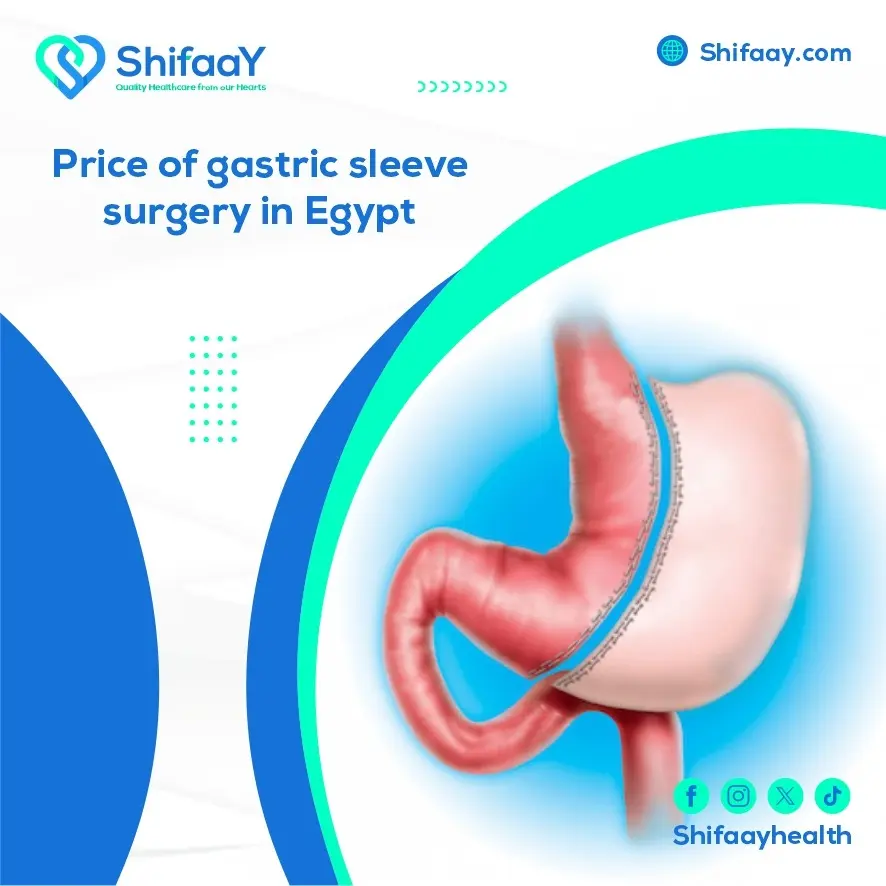
Gastric sleeve surgery represents a major turning point in the lives of many women who have long struggled with severe obesity. It is not merely a weight-loss procedure, but rather a gateway to a healthier and more confident life. Despite the various challenges some patients may face, many women have successfully overcome them and achieved remarkable results. Below, we highlight five successful stories of women who underwent gastric sleeve surgery:
First Experience:
Aisha, in her thirties, had been struggling with excess weight for many years. After failing with conventional weight loss methods, she decided to undergo gastric sleeve surgery. Within just six months, she managed to lose 40 kilograms, and her mental health significantly improved.
Second Experience:
Noor, a young woman in her mid-twenties, suffered from high blood pressure and joint pain due to obesity. After undergoing gastric sleeve surgery, she lost nearly 35 kilograms in less than half a year.
Third Experience:
Marwa, in her early thirties, opted for gastric sleeve surgery after multiple unsuccessful attempts to lose weight. Following the procedure, she gradually lost around 45 kilograms, with noticeable improvement in both her physical and mental well-being.
Fourth Experience:
Abeer, a woman in her forties, had chronic health issues such as diabetes and hypertension. After gastric sleeve surgery, she lost about 50 kilograms within a year and experienced a significant improvement in her mobility.
Fifth Experience:
Sara, in her mid-thirties, had failed in previous weight loss attempts. Gastric sleeve surgery was her last resort. She lost 30 kilograms in less than six months, which helped her regain self-confidence and significantly improved her overall health.
Read aslo: Carotid Endarterectomy (CEA)
Can You Get Pregnant After Gastric Sleeve Surgery?
Yes, it is possible to get pregnant after gastric sleeve surgery. However, it is recommended to wait 12 to 18 months after the procedure to ensure stable weight and nutritional balance, which helps secure a healthy and safe pregnancy for both mother and baby.
When Do Gastric Sleeve Surgery Results Appear?
The results of gastric sleeve surgery typically begin to appear within the first month, with gradual weight loss. More noticeable results are usually observed between 3 to 6 months, accompanied by improved overall health and activity levels.
Is Gastric Sleeve Surgery Painful?
The level of pain after gastric sleeve surgery varies from person to person. However, it is generally mild and temporary, and can be managed with painkillers. Most patients report feeling better just a few days after surgery.
How Long Does It Take to Recover from Gastric Sleeve Surgery?
Recovery from gastric sleeve surgery usually takes between two to four weeks, depending on the patient’s overall health condition and adherence to medical instructions and post-operative diet.

